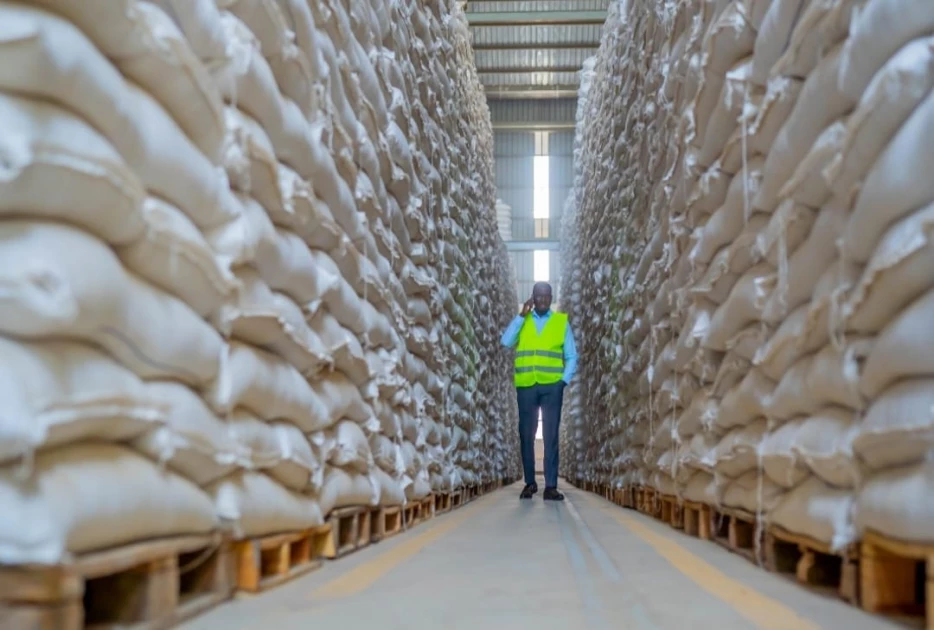Harvest Group hails Kenya for its AI-driven approach to food security

Laban Wanyama, Director of Harvest Ltd, Kenya, in a food store. PHOTO| COURTESY

Audio By Carbonatix
Kenya is advancing rapidly as a continental leader in leveraging artificial intelligence (AI) to tackle food security challenges and accelerate economic growth, reinforcing its role as a key player on the global stage.
This
progress was highlighted during the Africa Food Show (ASF) 2025 — East Africa’s
premier food and agriculture event hosted in Nairobi this month — which
showcased the country’s emerging position as a nexus of innovation, sustainable
growth, and regional connectivity.
According to
Harvest Group, an international agri-commodity trader that officially launched
in the Kenyan market in April, Kenya offers a rare combination of strategic
location, regional connectivity, and progressive policy, positioning the
country as an emerging hub for trade and logistics.
“At the core
of its national AI strategy is the drive to apply cutting-edge technologies in
critical sectors including in agriculture - using data-driven tools, predictive
modelling, and AI-powered logistics to boost yields, enhance food security, and
improve distribution across the continent,” said Almaz Alsenov, the founder of
Harvest Group. “The country’s AI
strategy is fostering a fertile environment for collaboration and market
growth, positioning Kenya as a hub for innovation in Africa.”
The 2024 'AI
for Africa' report published by the Global System for Mobile Communications
Association (GSMA) shows that agriculture and food security takes up 49 percent
of all AI deployments in Kenya, followed by climate action and energy use cases
at 26 percent and 24 percent.
The analysis
revealed over 90 instances of AI deployment within Kenya’s agricultural
systems. In these cases, Machine Learning (ML) was utilized to generate
critical insights on crop patterns, pest and weed management, land use, and
irrigation practices. Many of these AI-driven applications supported precision
farming by improving yield predictions, enhancing crop monitoring, and
optimizing resource use.
Moreover, AI
and ML technologies played a significant role in automating labor-intensive
tasks such as harvesting and weeding. By providing farmers with data-driven
guidance, these tools enabled the adoption of efficient, climate-smart farming
techniques that boosted productivity and sustainability.
According to the Kenya Institute for Public Policy Research and Analysis (KIPPRA), Kenya has seen several notable AI applications transforming its agricultural sector. For instance, PlantVillage Nuru is a mobile app that leverages TensorFlow machine learning to detect pests and diseases, and it has been adopted by over 10,000 farmers, helping increase their yields by up to 40 percent.
“UjuziKilimo’s
SoilPal, a device that provides real-time soil analysis (nutrient content,
moisture, pH), benefiting 30,000 farmers, with reported yield increases of over
40 per cent,” KIPPRA says on its website.
Another
innovative initiative, the ThirdEye Project by Future Water, employs drone
sensors to monitor crop stress, aiding 2,044 farmers in optimizing resource use
and achieving yield improvements of 20 percent.
Beyond
farming techniques, AI also plays a crucial role in strengthening market
linkages. Platforms such as Esoko and Safaricom’s DigiFarm utilize AI
technology to connect farmers directly with buyers, streamlining supply chains
and reducing inefficiencies. These AI-enabled market platforms not only enhance
farmers’ access to markets but also contribute to more reliable and efficient
agricultural commerce across Kenya.
Amid global
economic volatility, ongoing international conflicts, and the severe impacts of
climate change, Kenya is seen as providing “a pathway to strengthen food
security.”
With a
global shift to diversify supply chains away from traditional production hubs
such as China, Kenya’s strategic advantages are gaining fresh attention. It is
attracting commodity traders who recognize “opportunities for efficiency,
long‑term growth, and access to rapidly expanding regional markets,” Harvest
Group noted.
Transport
and logistics improvements complement technological advances. Kenya’s investment
in the Standard Gauge Railway (SGR) and the Nairobi Expressway has reduced
inland transit times from the key Indian Ocean port of Mombasa to Nairobi to
just five hours. The SGR ensures that the cargo can move quickly and safely to
Nairobi and on to where it is needed, allowing it to be distributed to other
countries.
This
enhanced connectivity, combined with Kenya’s advanced mobile infrastructure —
where mobile usage and electronic financial transactions are ubiquitous — forms
a sophisticated logistics ecosystem.
Harvest
Group’s recent establishment in Kenya underscores international investor
confidence. Partnering with the UN World Food Programme, Harvest Group works to
deliver grain to some of the world’s poorest countries to counter food insecurity.
Their presence highlights “growing trust in Kenya as a global leader in
distribution,” according to a press release by the company, which also noted
that their investment “in ships and storage facilities brings jobs to local
markets,” an opportunity aligned with Kenya’s “young and highly skilled
workforce.”
With
Europe’s markets showing signs of stagnation, global interest is pivoting
toward Africa’s dynamic trajectory. Kenya “offers an exciting opportunity for
tackling challenges like food insecurity,” the Harvest Group release stated.
Its unique combination of infrastructure development and technological
innovation allows commodity traders to “operate efficiently and react to
changes in market dynamics.”



Leave a Comment